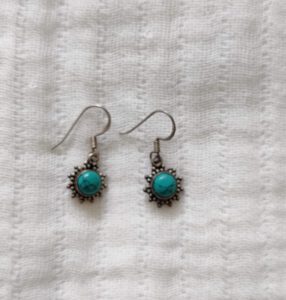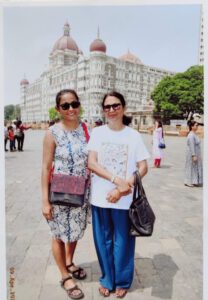by Megha Kashyap
As part of a workshop that I recently attended in London, we were asked to bring an object that reflects our teaching or practice. I found it quite hard to just pick one object because almost every object that I have, has a story.
However, for the workshop, I took a pair of beautiful silver earrings that my mum gifted me a few years ago from her first trip to Jaipur in Rajasthan.
Here it is:

Now, why is this pair of earrings so special and what has it got to do with my teaching or practice? I decided to pen this down to share with everyone, my story of growing up in a working class family in India.
I grew up in Assam, a north-eastern state in India. A state that has a fractured history of colonialism and post coloniality with contemporary India. Born in a working class family, way back in the 90s has its own set of unique privileges and struggles.
My father worked in a public sector organisation. He lost his job in 2003, as his organisation was privatise: as part of loan conditions attached by the International Monetary Fund for structural adjustment packages given to India in the 90s.
My mum worked as a Govt school teacher in a state government school in Assam. She was the sole earning member of the family after dad lost his job. With a family of six to feed and take care of, my mum struggled to make ends meet every month with her meagre state government salary. All four of us went to private school and both our parents put all their savings to making sure we receive good education.
I remember how I used to feel embarrassed at school because my parents were not rich enough like my friends who had fancy cars pick them up after school, or brought fancy school lunches. Because my mum had to leave the house early in the morning at 7 am, make breakfast for us, we had a standard lunch box of two slices of bread with butter, one boiled egg and one banana or apple slices. I used to complain that others always brought fancy lunches while my lunch was always the same. Dad used to pick us from school on his scooter and he made lunch and fed us. I never liked dad’s cooking because he made us eat only veggies. Only on Sunday’s we had chicken or mutton. I was also embarrassed that my mum always dressed in mekhela-sador , which is traditional assamese wear for women, whilst all my friend’s mothers wore lovely dresses and make-up.
There were days, when mum struggled to put food on our plates and she had to loan money from her friends or colleagues. There were times, when her colleagues ridiculed her for borrowing money to pay off school fees. She would never buy a saree or gift herself anything. All her earnings were spent on our school fees, college fees or our needs.
While mum worked outside the house to bring home money, dad shouldered all the care work. He made lunch and dinner for us, took care of us while also trying to start side business. He worked as an insurance agent for some time and pulled some weight off mum.
Now what has this story got to do with this pair of earring?
My parents never went for holidays. Never travelled outside of Assam until 2012, when I was working in my first job and saved some money to send them for a trip to Kolkata in West Bengal. That was their first ever trip outside of Assam. Some years later, my elder sister, who is a bureaucrat now, took our parents for a trip to Rajasthan, which is where mum brought this pair of earrings as a gift for me. All four of us siblings now take our parents for holidays.
While sharing about how this pair of earrings means to my practice in the workshop, I realised that my feminist principles and its grounding comes from my mum. My mum got married when she was 28 years of age. Back in the 70s, in a remote rural district in Assam, where girls would be married off as early as 12 years of age, my mum stood her ground to only get married once she gets a job. It was also because, she herself grew up in a poor family and after losing her dad, she and our eldest uncle had to shoulder family responsibilities.
My embarrassment of my working class parents, whilst growing up in Assam, is a deep regret that still continues to haunt me. Not that my parents were perfect parents, they are flawed too, in many ways, just like we all human beings are, but now that I am here, working and studying in the UK, I realise that my values, principles have come from my parents. These very same values and principles has guided me to take up feminist projects and dismantle racist spaces. And I am so grateful for their humble upbringing. I, now, own and take pride in my working class background.
Being a post-partition subject of the British Empire, growing up in working class family and having seen and experienced poverty and inequality, up-close and personal, I am eternally grateful to my parents for instilling in me all these values and principles. Without them, I would have probably lost myself. I found my home in this inter-generational feminism that my mum has passed down to me.

To end with, here is a picture of me and mum, on one of our recent trips to Mumbai in India. I surprised her with this trip in the month of April, 2022.
Megha Kashyap is a doctoral scholar at the Centre for Gender Studies in SOAS, University of London. She works as a Decolonisation Research Fellow at London South bank University. Prior to that she worked with Action Aid UK as a Policy Specialist on Women’s Economic Rights. She has over 11 years of experience of working on issues of gender and development in the Global South. Her PhD project is an exploration of borders and borderlands in South Asia from feminist perspective. Megha is a feminist activist and blogger. You can read her blogs at Etched by Clouds
